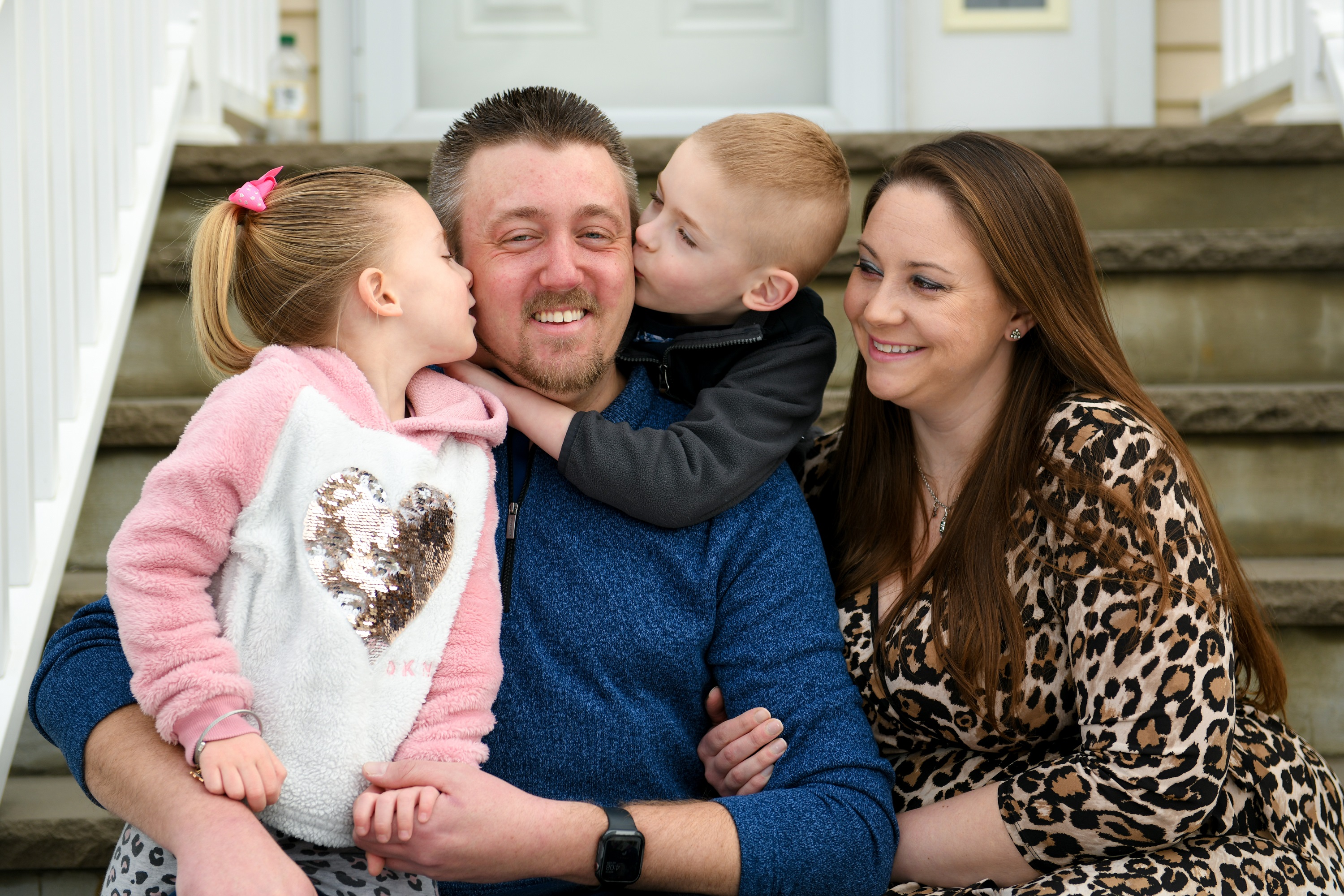Sayreville Man Shares Journey Back from Brain Injury

June 20, 2022
Dan Buhler, Jr., remembers the site in Edison where the environmental consultant was investigating the property’s former use as an old landfill. As part of his field work, test pits were being excavated to observe the soil below, and a contractor was on site clearing trees from the designated work areas. It was spring 2014.
Then, it all went dark.
Dan would later learn that a domino of falling trees sent one careening toward him, striking the back of his head with enormous force. Just 28 years old at the time, Dan suffered severe head injuries, including a fractured skull and damage to his right occipital lobe. His hard hat may have saved his life but could not prevent serious brain injury.
A helicopter took Dan to the nearest hospital, a level 1 trauma center. Several days later, as he started to emerge from a coma, he was transferred to the Center for Brain Injuries at JFK Johnson Rehabilitation Institute to begin the long journey back to the life he once knew.
Long Road to Recovery
At JFK Johnson, as Dan improved, he moved from the Acute Inpatient Rehabilitation Institute (Brain Trauma Unit) to the Sub-Acute Rehabilitation Institute (Extended Recovery Unit) to the Outpatient/Aftercare program (Outpatient Cognitive Rehabilitation Program). There, he learned to walk, talk and even swallow all over again.
Dan continues to benefit from the support of Brian D. Greenwald, M.D., medical director of the Center for Brain Injuries, and the brain injury team. He still has occasional symptoms and takes medication regularly, which sometimes needs adjusting. He uses the techniques he learned in rehabilitation to keep him focused, such as making lists and using calendars. He works harder than he did prior to the accident to keep organized. Sometimes he struggles to get his message across, so he might send an email prior to a meeting or important phone call to help clarify his talking points ahead of time.
He also suffers from a nervous system disorder known as Pseudobulbar affect, or PBA, which is a condition characterized by episodes of sudden uncontrollable and inappropriate laughing or crying. “The kids might do something wrong, and they will look at me for a reaction. I might give in laughing instead of disciplining, and I’ll wind up having to leave the room and let my wife step in,” he says.
Dan has found support from others living with brain injury. He was there last year when a group of brain injury survivors met with Tracy Morgan, the actor and comedian who was injured in a car accident on the New Jersey Turnpike, also in 2014. Morgan also received his care at JFK Johnson and continues to support the Center for Brain Injuries.
“Meeting Tracy was a cool experience,” Dan says. “So was talking with the other people with brain injuries who came to meet him. Brain injury rehabilitation does not end when you leave the hospital, so it’s nice to know you always have the support system here when you need it.”
‘Enjoying Wonderful Things in Life’
For Dan, each step forward has been a triumph of his own perseverance—and the support of his team of specialized physicians, nurses and therapists at the Center for Brain Injuries.
“They all provide the support system around you,” Dan says. “You have a lot of work ahead, and you must practice skills again and again. My recovery was not instantaneous. It was continuous.”
Today, nearly eight years after his injury, Dan is back to work as a senior project manager at a large geotechnical and environmental consulting firm and married to Andra, his girlfriend at the time of his accident. He also became a New Jersey licensed site remediation professional, passing a challenging test to do so. The couple are parents to 4-year-old twins, Zachary and Zaylee.
“I remember when I saw Dan after the accident,” Andra recalls. “He had scrapes all over his face, a breathing tube. He could squeeze my hand but was otherwise not very responsive.” She did not know what the future held for her boyfriend of just four months. “We’re so thankful for Dan’s recovery,” she says. The couple married in November 2015.
“Dan was severely injured when he came to us. And it was wonderful to see him keep getting better and move through our continuum of care,” Dr. Greenwald says. “Now he is back to work, married and a father. He’s enjoying wonderful things in his life. That’s what we want for all of our patients.”
Next Steps & Resources:
- Meet our source: Brian D. Greenwald, M.D.
- To make an appointment with Dr. Greenwald or a doctor near you, call 800-822-8905 or visit our website.
- Learn more about the Center for Brain Injuries at JFK Johnson Rehabilitation Institute
The material provided through HealthU is intended to be used as general information only and should not replace the advice of your physician. Always consult your physician for individual care.
Can Brain Injury Change Your Personality?

Brain injury may alter personality. Learn about common symptoms and available treatments from Dr. Alphonsa Thomas. Call 800-822-8905 for care.
Head Trauma: Know When to Get Help

Head Trauma: Know when to seek help. Learn about symptoms, treatment, and when to get emergency care from leading doctors. Call 800-822-8905.

Why Seizures May Happen After a Head Injury
Head injury seizures: Understand causes, symptoms, & safety tips from Dr. Chen. Get expert care & resources. Call 800-822-8905.

Do Brain-Training Games Really Boost Brain Power?
Boost your brainpower! Learn how brain training games and healthy habits improve memory and focus. Dr. Parulekar shares expert advice. Call 800-822-8905.

What to Do if Your Child Has a Head Injury
Child head injury? Learn when home care or immediate medical attention is needed. Doctors Marcantuono & Mazzola offer guidance. Get care now.

What Is Neuro Fatigue?
Neuro fatigue explained. Learn about causes, treatments, and prevention strategies from Dr. Krupa Pandey. Schedule an appointment today.
